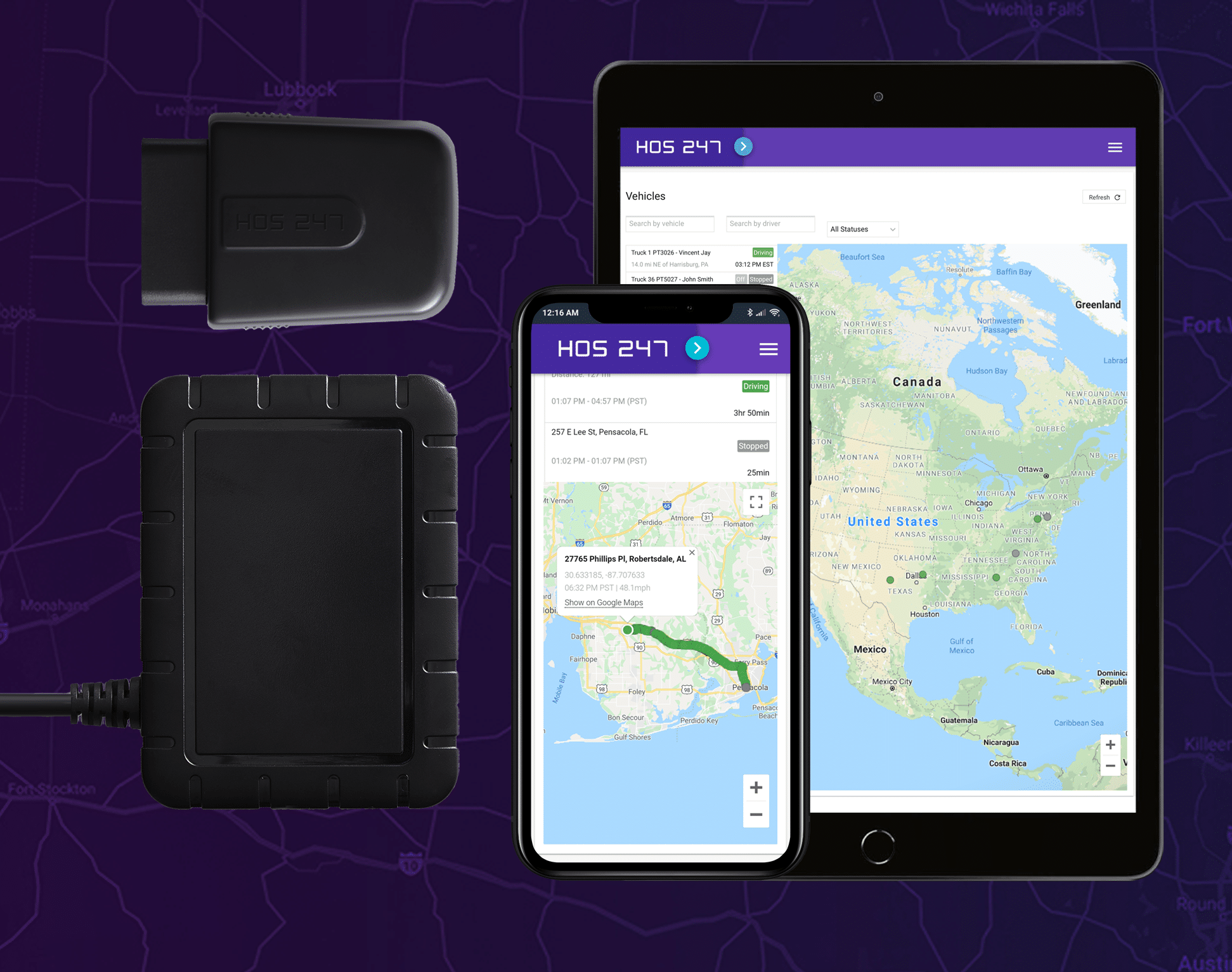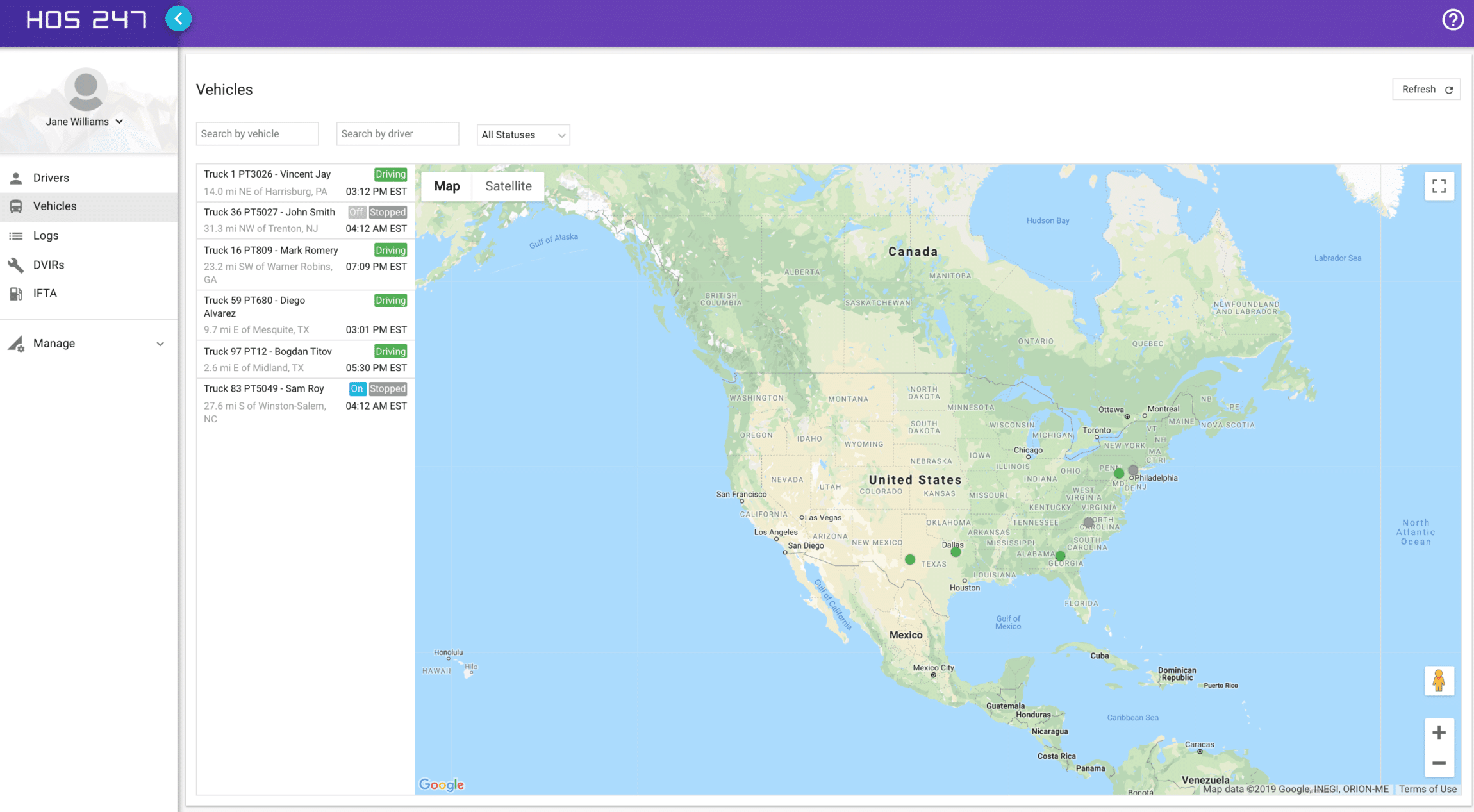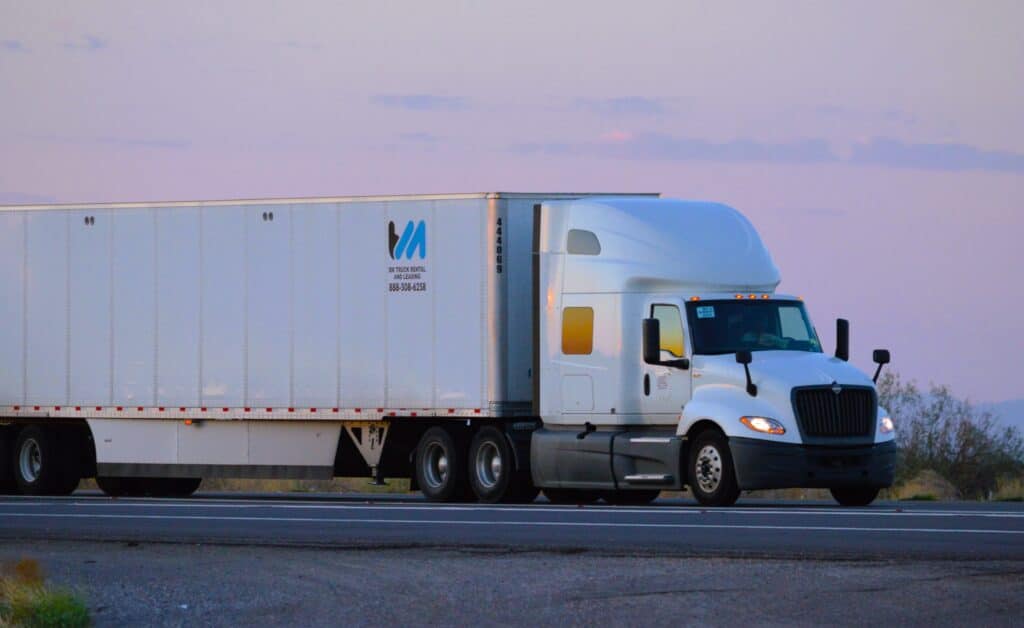The open road has always meant freedom for truckers, but today’s trucking industry comes with challenges beyond driving skills alone. From hours-of-service compliance to fuel management and maintenance tracking, modern trucking requires effective management tools to stay competitive and compliant.
GPS fleet tracking systems have evolved from simple location tools into comprehensive management solutions that directly impact your operation’s efficiency. If you’re considering switching GPS providers or investing in your first fleet tracking system, you’re making a decision that will affect your daily operations. The right solution doesn’t just show where your trucks are—it optimizes routes, monitors driving patterns, reduces fuel waste, and provides valuable data that can help your bottom line.
This guide aims to help you evaluate what truly matters when choosing amongst the best fleet tracking companies. We’ll examine key features, highlight leading providers, and offer practical advice for implementing a system that delivers real value for your investment.
Do you have any questions? Talk to ELD Advisor: 650-405-3372 or Request Callback
What to Look for in GPS Fleet Tracking Solutions
Not all GPS tracking systems deliver equal value. Before comparing providers, understand which factors matter most for your trucking operation.
- Hardware reliability. Look for GPS devices tested in real trucking conditions, including vibration, temperature extremes, and rough handling. Hardware failures remain a top complaint among truckers unhappy with their current provider.
- Signal connectivity. Quality systems maintain connectivity in challenging areas and automatically restore tracking when signals return. The best options include data recovery for when connectivity issues occur.
- Real-time tracking. Accurate, up-to-the-minute location data improves customer service and allows for efficient dispatching.
- Power management. Well-designed systems minimize battery drain during idle periods, preventing issues with truck batteries and electrical systems.
- User-friendly interface. Systems with clear maps and intuitive controls require minimal training and see better adoption among drivers. Look for solutions designed with truckers in mind, not just office staff.
- Mobile accessibility. Apps for smartphones or tablets provide flexibility in how you access tracking data, allowing management on the go.
- Installation simplicity. Some systems require complex wiring while others offer simple plug-and-play installation that can be completed in minutes.
- Support quality and availability. Ensure efficient technical help is available during your typical operating hours, including weekends and holidays when many trucks are still running.
- Hardware cost structure. Some systems require upfront equipment purchases while others include hardware in monthly fees. Choose what works for your cash flow.
- Risk-free trial periods. Look for providers offering real-world testing before committing your business to ensure the system meets your needs.
- ELD compatibility. If you use electronic logging devices, look for GPS systems that complement or integrate with them for a unified solution to achieve compliance with Transport Canada requirements.
With numerous GPS providers available, focus on identifying your primary goals, technical resources, total cost of ownership, and request demonstrations before making your final decision.
Top GPS Fleet Tracking Companies for Truckers
The Canadian GPS fleet tracking market offers numerous options, but truckers always ask: what is the best fleet tracking company? Each provider has different strengths and limitations and the best one is not the same for every carrier. Here’s an overview of leading providers that serve the trucking industry followed by some considerations to choose the best fit for your operation.

HOS247
HOS247 offers a complete fleet management system with real-time GPS tracking, automatic IFTA calculations, and ELD compliance tools. The platform features an easy-to-use interface, support in multiple languages, and flexible pricing with no long contracts. Plans start at $19 per vehicle monthly for ELD Compliance, while the ELD Track plan (including GPS tracking) costs $22 per vehicle monthly. Key features include live tracking, maintenance alerts, and driver behavior monitoring to help keep your fleet running smoothly.
Azuga
Azuga focuses on driver safety using game-like rewards for safe driving. They provide GPS tracking, vehicle health checks, and tools for ELD, DVIR, and HOS compliance. Pricing typically runs between $25 and $35+ per vehicle each month, with features like dash cam connections and safety insights.
GPS Insight
GPS Insight offers tracking solutions that grow with your business. Fleet managers can watch vehicles in real time, create alerts for idling or speeding, and generate detailed reports. The system helps with maintenance scheduling and driver safety. Prices start at $14.95 per vehicle monthly, with options to add AI dash cams for higher rates.
Verizon Connect
Verizon Connect delivers extensive tracking alongside fleet management tools like fuel monitoring, custom alerts, and easy scheduling. They offer AI dash cams and in-vehicle coaching to improve safety and efficiency. Pricing begins around $20 per vehicle monthly for basic service, with premium packages available. Be aware that contracts typically require a 36-month commitment.
Rhino Fleet Tracking
Starting at $21.95 monthly per device, Rhino provides essential tracking and compliance tools, including real-time location monitoring and maintenance scheduling. They offer a free demo for businesses considering their service.
One Step GPS
One Step GPS offers cost-effective tracking with PTO monitoring starting at $13.95 per vehicle monthly. It’s designed for businesses needing reliable GPS tracking without a large upfront investment. They also offer a GPS tracking and ELD system for $20.95 per month per vehicle
Choosing the Right Provider for Your Operation
When evaluating these providers, consider your specific needs:
- Fleet size. Larger fleets benefit from advanced management features, while smaller operations may prefer simplicity and lower costs.
- Technical resources. Some systems require significant setup, while others are designed for operations without IT staff.
- Main challenges. Focus on providers that excel in addressing your specific problems, whether that’s fuel management, driver safety, or customer communication.
- Budget reality. Premium features deliver value only if they address your specific needs. Don’t overpay for features you won’t use.
- Growth plans. Choose a system that can grow with your operation without requiring a complete change as you add trucks.
While these companies represent established players, at HOS247 we have gained significant market share by addressing specific pain points in the industry, particularly around reliability and customer support.

HOS247 GPS Fleet Tracking System
At HOS247, we’ve developed a GPS fleet tracking system specifically for commercial truckers who need reliable tracking with outstanding customer support. We understand the unique challenges truckers face daily and have created a solution that addresses these needs directly.
Our GPS tracking system includes the following key features and benefits:
- User-friendly interface. Dashboard and mobile app designed specifically for truckers with clear maps and easy-to-read displays that work in various lighting conditions.
- Reliable hardware. Tough devices built to handle rough roads, extreme temperatures, and daily truck use. Our trackers stay connected even in remote areas and reconnect automatically if signals drop.
- Flexible plans. Month-to-month service options with no long-term contracts, clear pricing without hidden fees, and scalable options that grow with your business.
- Multilingual support. Seven-day-a-week live assistance from agents fluent in English, Spanish, Russian, and Polish, with a callback policy if calls drop.
- Real-time tracking. Minute-by-minute location updates for improved dispatching and customer service.
- Route history. Detailed playback for analyzing trips and resolving disputes.
- Fuel management. Idling monitoring to identify waste and reduce unnecessary engine hours.
- Driver behavior insights. Track hard braking, fast acceleration, and speeding patterns to improve safety and reduce costs.
- Maintenance scheduling. Automated reminders based on mileage or engine hours to prevent breakdowns.
- Two-week trial. Risk-free evaluation period with full access to all features and support.
- Simple setup. Quick hardware installation and intuitive controls minimize disruption during implementation.
For truckers looking to replace an unreliable system or implement tracking for the first time, we provide a balanced solution that combines advanced features with operational simplicity. Experience the difference our industry-focused approach can make for your fleet management needs.
How GPS Fleet Tracking Impacts Your Bottom Line
Investing in a GPS fleet tracking system directly improves your profits in several key areas:
- Route optimization. Finding the most efficient routes helps reduce total miles driven, speeds up deliveries, lowers toll expenses, and cuts down on paperwork.
- Fuel savings. Tracking systems monitor idle time, driving speed, and unauthorized vehicle use to help reduce fuel consumption across your fleet.
- Insurance benefits. Many insurance companies offer discounts for fleets with GPS tracking as these systems improve safety and help recover stolen vehicles.
- Maintenance improvements. Regular service reminders based on actual mileage help prevent breakdowns and extend vehicle life.
- Compliance protection. Avoid costly fines by tracking hours-of-service (when integrated with ELDs) and managing required stops.
- Office efficiency. Automated reporting, simplified payroll, and streamlined dispatching save valuable administrative time.
Most fleets see a complete return on their investment within several months. The best results come from fully using all the features available in your tracking system.

Implementing a New GPS Fleet Tracking System
Switching to a new GPS tracking system fur trucks requires planning. Here’s our guide to ensure a smooth transition:
Steps to Transition from Old to New Systems
- Evaluate your current setup. Document what works and what doesn’t, list regularly used features, identify pain points, and gather feedback from both drivers and office staff.
- Plan for data migration. Transfer important historical data including maintenance records, driver performance, customer locations, and route histories for regular deliveries.
- Schedule installation strategically. Stagger installations to minimize disruption, schedule during planned maintenance when possible, start with a pilot group, and have backup plans ready. Our installation typically takes only minutes per vehicle.
- Run parallel systems temporarily. Keep your old system running alongside the new one briefly to verify data accuracy, ensure team access, and address any gaps before completely switching.
Training Considerations
For Drivers: Focus on daily features, emphasize benefits (less paperwork, fewer check-ins), provide simple guides for the cab, offer multilingual training if needed, and demonstrate how the system protects them in disputes.
For Dispatchers and Managers: Provide more comprehensive training on reporting and analytics, create standard procedures, offer follow-up sessions, and establish super-users who can help train others.
Common Implementation Challenges and Solutions
- Driver resistance. Emphasize direct benefits and involve respected drivers in testing.
- Technical difficulties. Our 7-day support ensures quick resolution, and our callback policy means you’re never left hanging.
- Information overload. We start with essential features before gradually introducing additional capabilities.
- Inconsistent usage. We help establish clear policies and provide usage reports to identify areas needing additional training.
- Integration issues. Our team works directly with your IT department to ensure smooth data flow between systems.
Setting up a new GPS system usually takes a few weeks from start to finish. The timeline can be shorter or longer depending on how many trucks you have and how quickly you need to be up and running. For success, good communication is essential. The best fleet tracking companies will help you throughout the process to solve any issues that come up along the way.
FAQ Section
How difficult is it to install GPS tracking devices?
Our GPS tracking devices are designed for simple installation. Most trucks can be equipped in minutes without special tools or technical knowledge. We provide clear instructions, and our support team is available to guide you through the process if needed.
How accurate is GPS tracking for ETAs?
Modern GPS tracking provides highly accurate location data. Our system considers traffic conditions, historical travel times, and driver patterns to generate reliable ETA predictions. This accuracy helps improve customer satisfaction and operational planning.
Can I monitor multiple vehicles on one screen?
Yes, our dashboard allows you to view your entire fleet simultaneously. You can see vehicle locations, status, and movement at a glance. The system also allows you to focus on specific vehicles or groups when needed.
Does GPS tracking work in rural areas?
Our GPS tracking maintains functionality in most rural areas. The system stores tracking data if a connection is temporarily lost and automatically syncs when connectivity returns, ensuring continuous tracking even in areas with limited cellular coverage.
How does GPS tracking affect vehicle warranty?
Our tracking devices connect to the vehicle without modifying essential systems and won’t void manufacturer warranties. The installation is non-invasive and follows industry best practices.
Can GPS tracking reduce our insurance costs?
Many insurance providers offer reduced premiums for fleets with GPS tracking. The systems help prove safe driving practices, deter theft, aid in vehicle recovery, and document compliance with safety regulations. Contact your insurance provider to learn about potential discounts.
What happens if a driver forgets to use the system?
Our GPS tracking works automatically once installed. While drivers may need to interact with certain features, core tracking functions require no daily driver input, ensuring consistent data collection regardless of driver involvement.

Conclusion
Selecting the best GPS fleet tracking company available impacts your operations and profitability. When evaluating options, prioritize reliability with proven hardware, user-friendly interfaces that drivers will actually use, responsive customer support, and flexible plans that grow with your business. Remember that real value comes from features you’ll use daily, not from impressive but unnecessary capabilities.
At HOS247, we’ve designed our GPS tracking solution specifically for trucking operations. Our reliable hardware, intuitive interfaces, multilingual support, and flexible plans make us the preferred choice for truckers seeking better fleet management.
We invite you to assess your current tracking needs and experience our two-week trial. See firsthand how our system improves efficiency, reduces costs, and simplifies operations. Contact us today to start your journey toward better fleet management.

As an expert in B2B and B2C sales, I’ve dedicated myself to perfecting sales processes and client retention strategies in the logistics and trucking industry. I have significantly contributed to the expansion of the ELD service, catering to retail and wholesale clients in need of HOS247 ELD solutions. My unwavering commitment to implementing state-of-the-art sales techniques and technologies ensures the continuous growth and success of businesses I work with.












Commercial trucking operations, including everyone from large carriers to owner-operators, are subject to the electronic logging device rule and will require ELDs to operate legally. This requirement came into effect on June 12, 2021, with a full implementation date of

Picture this: you’re approaching a weigh station when you notice your ELD screen has gone dark. Your heart rate picks up a bit as you try to restart the device, hoping the logs are still there. Sound familiar? Many drivers

HOS247 HOS247 Rating HOS247 HOS247 Rating HOS247 is a top ELD provider in the trucking industry. We offer a heavy vehicle log book app for transportation professionals that takes care of compliance and optimizes fleet operations. Our customers